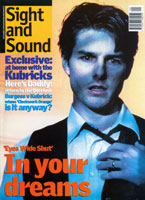Primary navigation

France 1999
Reviewed by Chris Darke
Our synopses give away the plot in full, including surprise twists.
Paris. Gabriel Deshayes and his ex-girlfriend Jenny are selling their flat. Gabriel - involved in a new relationship with the volatile Anne - arranges for a television documentary to be made about his writer-friend Adrien Willer. Jenny calls Gabriel from hospital when Adrien unexpectedly collapses. One month later, Adrien, out of hospital, travels with Gabriel to Mulhouse for the filming and admits that his attack signalled the return of a dormant and dangerous disease. Anne shows up uninvited which leads to a row with Gabriel.
Three months pass. Returning to Paris, Gabriel and Jenny dine together and argue. Adrien is admitted to hospital for an operation whose seriousness he admits only to Véra, his teenage girlfriend whose existence he conceals from his friends. Gabriel takes Anne to visit his family where his brother tells him he's a fool for splitting up with Jenny. Gabriel accepts a job editing the literary section of an encyclopedia and, with Adrien out of hospital, offers his friend some work. Adrien asks for time to consider.
One evening Gabriel and Anne have an argument when she discovers that he doesn't want them to live together. A phone call from Jérémie, Adrien's agent, informs Gabriel that Adrien has died. Adrien's posthumous book is critically well received and Gabriel, having completed a ghost-writing assignment, admits to Anne that he's almost finished a novel. Jenny and Jérémie are now a couple.
In many respects Late August, Early September can't help but be seen as a follow-up to Olivier Assayas' 1997 cult success Irma Vep. While Assayas could be said to have returned to subject matter more characteristic of his previous films (Une nouvelle vie, Paris s'éveille), the formal dexterity he showed in Irma Vep remains here. Late August traces the effects of the illness and death of the writer Adrien Willer on a group of friends. The film's principal perspective is that of would-be writer Gabriel Deshayes, for whom Adrien is a mentor. Gabriel persuades Adrien to participate in a documentary on his work and when the cynical producer asks, "Who reads Adrien Willer?", the film sets itself a task beyond being a dramatic catalogue of the effects of bereavement within a tight social circle.
Late August is more concerned with Adrien's social death than his physical death, more interested in unravelling the tangles of dependence and independence that mark friendships inflected with artistic ambitions. The territory of Late August, Early September is familiar, not only from Assayas' previous films, but also as a larger strand of French cinema for which the refined and psychologically acute depiction of urban middle-class manners is a mainstay. At its most superficial, this delivers works such as Portraits chinois where the privileged milieux of fashion, art and the media are the film's flimsy substance rather than its pretext and in which the characters' angst seems part of an aspirational package. But Late August is closer to the world of Comment je me suis disputé (ma vie sexuelle), an impression partly reinforced by the casting of Mathieu Amalric and Jeanne Balibar.
Amalric is a sympathetic presence as Gabriel, clever but not necessarily very smart, shading the character with intimations of ambiguous power play centred on his probably exaggerated respect for Adrien's achievements. One feels that Gabriel admires the fact that Adrien writes rather more than what he writes. His attempts to 'help' Adrien after a major operation are contextualised with cruel comedy. It transpires that it's Jenny, Gabriel's ex-girlfriend, in whom Adrien confides most. Blessed with an unusual ability to express at least three conflicting emotions at any one time, Jeanne Balibar gives Jenny a skittish presence - all nose, eyebrows and gangling limbs - focused by blazing looks and off-beat smiles. The intensity she brought to the damaged young philosophy student in Comment je me suis disputé is muted here. She and Amalric (who are a couple off-screen) are becoming the modern face of the thirtysomething urban French couple and since Late August, Early September they have played opposite each other again in Jean-Claude Biette's Trois ponts sur la rivière.
Late August has the sensation and impact of a brilliantly executed meditative flurry. It used to be said of French art cinema that there was too much talking, and Assayas seems to have come up with a simple solution to this cliché. His characters expound with the best of them but he keeps them moving or surrounds them with an incessant motion that suggests the speed of the life encircling them and which won't relax to make a reckoning with mortality any easier. Denis Lenoir's camera is almost always on the move, shoulder-borne, shuddering or looking for blurred close-up detail to put to use in the film's transitional sequences.
There's at least one moment of terrific formal control when Anne, Gabriel's new girlfriend, rides off in a taxi after an argument and buys a lottery scratchcard. It's nothing more than a transitional moment, but it works gently to shift the film's gears. Assayas can handle the elegant, Téchiné-style anatomisation of emotions while still being capable of stylistic legerdemain.
Likewise, the film's organisation into four 'chapters' gives Late August what might be called a cubist structure - Gabriel may be the privileged protagonist, but the information that we get from his perspective is contextualised, questioned and offset by the perspectives of the other characters - a multifocal narrative structure that leaves much for second and third viewings.